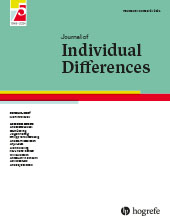Entwicklung und Überprüfung einer Kurzform der Familienklimaskalen für Jugendliche (K-FKS-J)
Abstract
Zusammenfassung: Ziel der vorliegenden Untersuchung war die Entwicklung einer Kurzform der Familienklimaskalen (FKS) von Schneewind et al. (1985), die eine ökonomische und reliable Diagnostik der von Jugendlichen perzipierten Familienumwelt gestattet. Hierzu wurde eine auf 40 Items gekürzte Fassung der FKS einer Stichprobe von 1220 Jugendlichen zwischen 14 und 16 Jahren vorgelegt, die in zwei Zufallsstichproben aufgeteilt wurde. Anhand der ersten Zufallsstichprobe (N = 609) wurde eine faktorenanalytisch basierte Kurzform erstellt, die anhand der Daten der zweiten Zufallsstichprobe (N = 611) erfolgreich kreuzvalidiert werden konnte. Diese Kurzform der Familienklimaskalen für Jugendliche (K-FKS-J) umfaßt 30 Items, die sich folgenden fünf Skalen zuordnen lassen: “Positiv-emotionales Klima”, “Aktive Freizeitgestaltung”, “Organisation”, “Kontrolle” und “Intellektuell-kulturelle Orientierung”. Die internen Konsistenzen sind mit α = .67 bis .80 als zufriedenstellend bis gut, die Skaleninterkorrelationen als niedrig zu bezeichnen. Ferner wird auf die Notwendigkeit einer Validierung der Kurzform an Elternstichproben verwiesen.
Summary: The aim of the present study was the development and validation of a short-form of the Family Environment Scale by Moos (1974). 1220 pupils aged 14 to 16 completed 40 items of the German version of the FES by Schneewind et al.(1985) and the sample was divided randomly into two subsamples. Based on factor-analytic results a short-form was developed with the one half of the data; the structure of the questionnaire could be successfully cross-validated using the second half of the sample (N = 611). The Short-form of the Family Environment Scale for Adolescents (K-FKS-J) consists of 30 items constituting five scales: “Positive-Emotional Climate”, “Active Recreational Orientation”, “Organization”, “Control”, and “Intellectual-Cultural Orientation”. For all scales we found good to satisfactory internal consistencies. The intercorrelations of the scales were generally low. For future research we emphasise, that the validation of the K-FKS-J on parent-samples is necessary.
Literatur
Benninghoven, D. , Cierpka, M. , Thomas, V. (1996). Die familiendiagnostischen Fragebogeninventare.. In M. Cierpka (Hrsg.), Handbuch der Familiendiagnostik (S.431-455). Berlin: Springer. .Bortz, J. (1993). Statistik. . Berlin: Springer. .Guadagnoli, E. , Velicer, W.F. (1988). Relation of sample size to the stability of component patterns.. Psychological Bulletin, 103, 265– 275 .Horn, J.L. (1965). A rationale and test for the number of factors in factor analysis.. Psychometrika, 30, 179– 185 .Kröger, F. (1994). Familiäre Interaktion bei Suchtkranken. Eine empirische Studie zum Interaktionsverhalten in Alkoholkranken- und Eßstörungsfamilien. . München: Verlag für Akademische Schriften. .Lienert, G.A. , Raatz, U. (1994). Testaufbau und Testanalyse. . Weinheim: Psychologie Verlags Union. .Moos, R. (1974). Family Environment Scale (FES). . Palo Alto: Consulting Psychologists. .Moos, R. , Moos, B.S. (1981). Family Environment Scale. . Palo Alto: Consulting Psychologists. .Rietz, Ch. (1996). Faktorielle Invarianz. Die inferenzstatistische Absicherung von Faktorstrukturvergleichen. . Bonn: Pace-Verlag. .Schmidt-Rinke, M. (1983). Familienklassifikation in der familiären Sozialisationsforschung. . Unveröffentlichte Dissertation, Universität München. .Schneewind, K.A. (1988). Die Familienklimaskalen.. In M. Cierpka (Hrsg.), Familiendiagnostik (S.232-255). Berlin: Springer-Verlag. .Schneewind, K.A. (1995). Impact of family processes on control beliefs.. In A. Bandura (Ed.), Self-efficacy in changing societies (pp.114-148). New York: Cambridge University Press. .Schneewind, K.A. , Beckmann, M. , Hecht-Jackl, A. (1985). Das FK-Testsystem.. Das Familienklima aus der Sichtweise der Eltern und der Kinder. . Forschungsberichte aus dem Institutsbereich Persönlichkeitspsychologie und Psychodiagnostik, Nr.8.1. München: Ludwig-Maximilians-Universität. .Schneewind, K.A. , Ruppert, S. (1995). Familien gestern und heute: ein Generationsvergleich über 16 Jahre. . München: Quintessenz. .Seiffge-Krenke, I. , Schmidt, C. (1999). Das leistungsorientierte Familienklima mit chronisch kranken Jugendlichen: Funktional oder dysfunktional für die medizinische Adaptation?. Zeitschrift für Klinische Psychologie, 28, 1– 8 .Stevens, J. (1996). Applied multivariate statistics for the social sciences (3rd ed.).. Hillsdale: Lawrence Erlbaum Associates Publishers. .



